Multiple sclerosis patients can gain significant benefits from fitness, including improved cardiovascular health, reduced fatigue, and enhanced balance and mobility. You’ll build strength, boost cognitive function, and experience better mental health through reduced depression and anxiety. Virtual reality fitness options provide engaging, low-impact alternatives that adapt to your mobility level while tracking progress. Exercise also creates opportunities for social connection, helping combat isolation. Discover how combining traditional and virtual approaches might transform your MS management strategy.
Cardiorespiratory Benefits of VR Fitness for MS
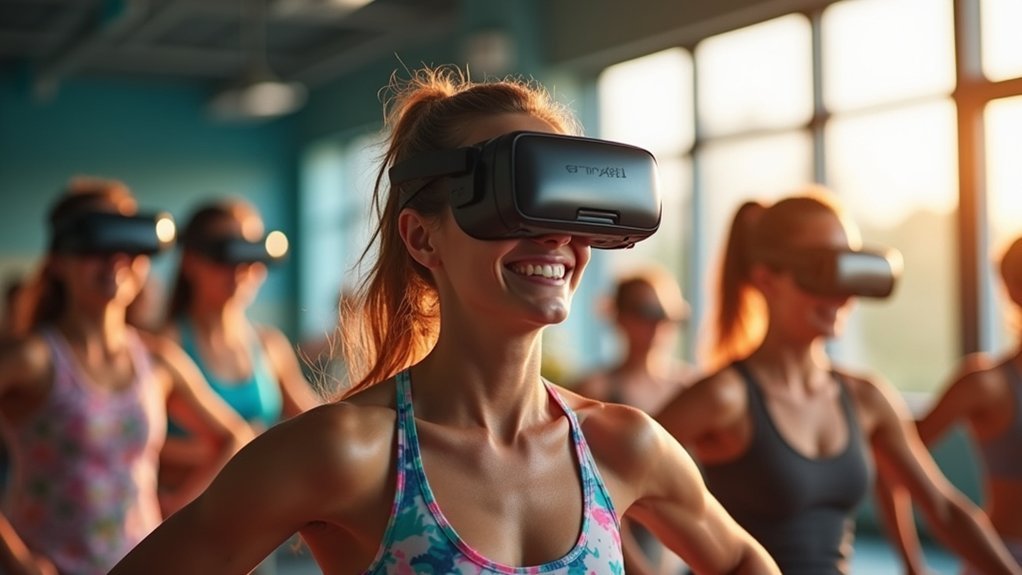
Virtual reality has emerged as a game-changer in MS fitness regimens, offering substantial cardiorespiratory benefits through immersive, customizable exercise experiences.
These safe, engaging protocols specifically target aerobic conditioning while adapting to your personal tolerance levels.
Studies show that regular VR exergaming sessions improve not just your cardiovascular endurance but also enhance mobility and postural control.
After completing programs like 20 sessions across seven weeks, you’ll likely notice improved gait and balance—essential foundations for better cardiorespiratory function.
What makes VR particularly valuable is its ability to make sustained aerobic activity enjoyable while minimizing injury risks.
You won’t have to worry about overexertion, as the virtual environment can be precisely adjusted to your needs, optimizing cardiorespiratory conditioning without exacerbating symptoms.
Recent research involving patients aged 23 to 61 years demonstrates that VR therapy significantly improves quality of life compared to conventional treatments.
Fatigue Reduction Through Immersive Exercise
Although fatigue remains one of the most debilitating symptoms for MS patients, immersive exercise offers powerful strategies to combat this persistent challenge.
Mind-body exercises like yoga and tai chi, combining movement with controlled breathing, can considerably reduce your fatigue levels.
The harmonious fusion of movement and breathwork in yoga and tai chi offers powerful fatigue relief for those with MS.
The ideal dose for fatigue reduction is about 650 MET-minutes weekly—roughly 2.5 hours of immersive activities. You’ll find this approach particularly effective as it engages your mind while exercising your body, creating a distraction from fatigue sensations.
Beyond physical benefits, immersive exercise improves your mood and cognitive engagement, directly reducing fatigue perception. Research shows that resistance exercises provide the most substantial fatigue improvements compared to other exercise types.
Virtual reality environments enhance motivation and self-efficacy, helping you better manage symptoms. Rest assured, these approaches are safe and can be adapted to your specific disability level.
Balance and Walking Improvements via Virtual Training
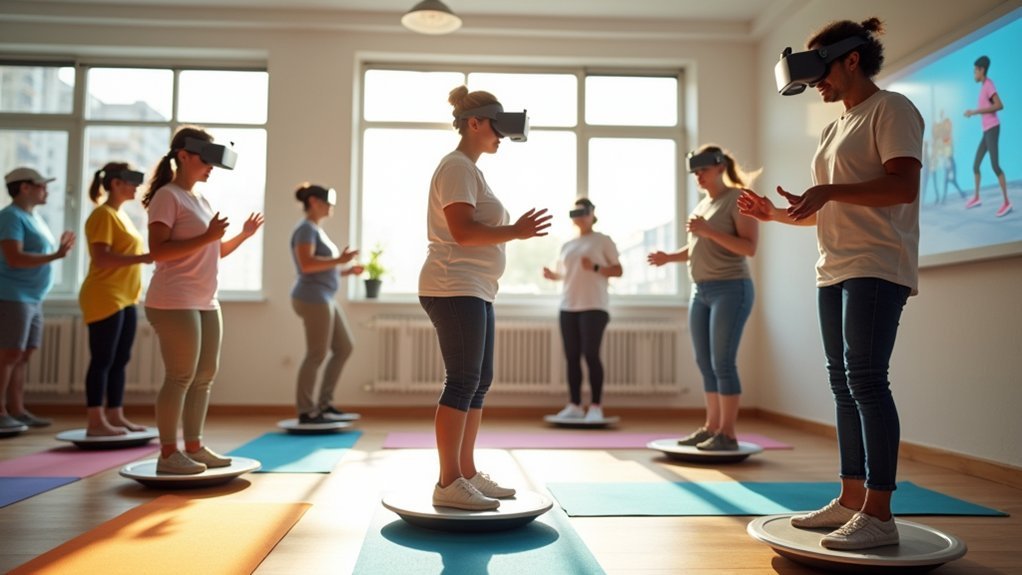
For many MS patients, balance difficulties and walking impairments represent significant daily challenges that can limit independence and quality of life. Virtual reality training offers a promising solution with proven advantages over conventional therapy. You’ll likely experience better outcomes with VR-based interventions, which show moderate clinical effects and higher adherence rates. Research indicates that VR interventions consistently demonstrate significant improvements in balance compared to standard training methods.
| VR Training Benefits | Traditional Therapy | Your Advantage |
|---|---|---|
| 94.3% adherence rate | 90.3% adherence rate | Better consistency |
| Immersive environment | Standard exercises | Increased motivation |
| Personalized programs | Generic protocols | Tailored to your needs |
| Immediate feedback | Delayed feedback | Faster improvement |
| Home accessibility | Clinic visits required | Fewer transportation barriers |
With sessions typically lasting 30-85 minutes twice weekly, VR training combines gait and balance exercises in a safe, engaging environment that adapts to your specific challenges.
Mental Health Advantages of VR Movement Therapy
VR movement therapy offers you significant mood enhancement benefits, reducing stress and combating depression while providing engaging experiences that can boost your overall emotional well-being.
You’ll likely notice improvements in cognitive functions, including better processing speed and working memory, which complement the mental health benefits of this innovative approach.
These cognitive improvements, coupled with personalized virtual experiences, create a thorough therapeutic advantage that supports your psychological resilience as you manage MS symptoms. The immersive nature of VR interventions also helps reduce feelings of isolation commonly experienced by patients with neuromuscular diseases.
Mood Enhancement Benefits
While managing physical symptoms remains a priority, the mental health advantages of VR movement therapy for MS patients shouldn’t be overlooked.
VR interventions can greatly boost your mood regulation by enhancing both positive and negative affect through immersive experiences.
You’ll likely experience reduced depression, anxiety, and stress as VR provides engaging emotional escapes from daily challenges.
The technology offers welcome relief from social isolation through virtual interactions and shared activities, fostering a sense of community when physical limitations restrict your social engagement.
Both interactive and passive VR sessions contribute to improving momentary positive emotions, with benefits potentially increasing over time.
As you engage with customizable content tailored to your preferences, you’ll develop better coping strategies that enhance your overall quality of life and emotional well-being. These virtual environments create calming virtual settings that can significantly aid in pain management through distraction techniques.
Cognitive Function Improvements
Beyond improving physical abilities, cognitive function enhancement represents a significant advantage of VR movement therapy for MS patients. VR creates immersive environments that engage multiple brain functions simultaneously, offering cognitive benefits that extend beyond traditional rehabilitation approaches.
When you participate in VR-based exercises, you’ll experience:
- Improved processing speed and executive function through multi-modal cognitive challenges
- Enhanced dual-task coordination as you navigate virtual scenarios while performing physical movements
- Strengthened memory and learning capabilities through multisensory integration
- Better attention and concentration skills that persist months after completing the program
- Increased cognitive-motor integration, directly supporting daily activities that require thinking while moving
These cognitive improvements occur because VR uniquely combines physical therapy with mentally stimulating tasks, creating an ideal environment for neuroplasticity while maintaining high engagement levels. Recent research shows that adding virtual reality to cycling exercises provides safer alternative training options for patients with mobility disabilities compared to walking-based exercises.
Social Connection Through Virtual Group Exercises
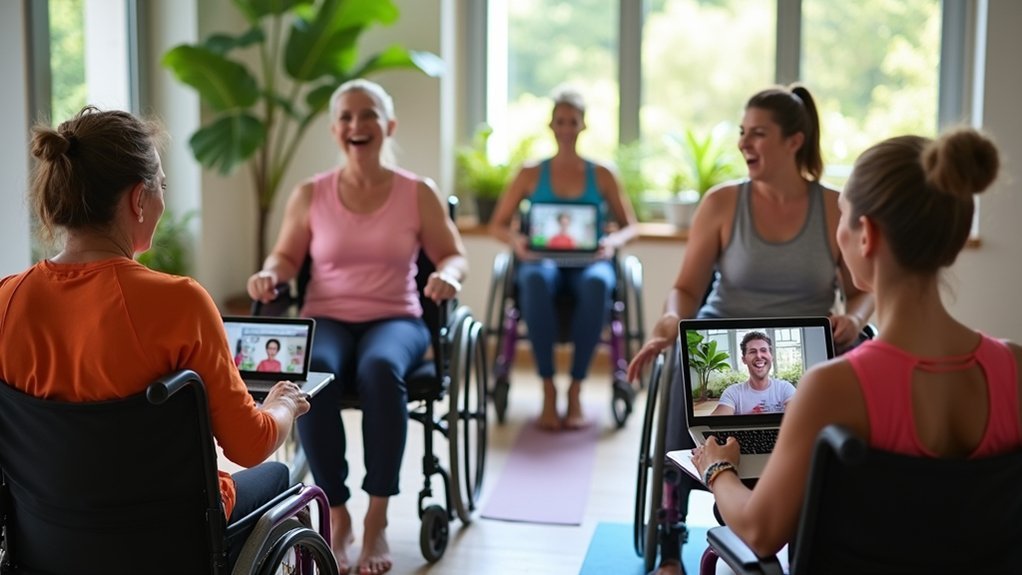
Although many focus primarily on the physical benefits of exercise, virtual group fitness programs offer MS patients something equally valuable: meaningful social connection.
When you join online exercise groups, you’ll experience reduced isolation while building a supportive community with others who understand your challenges.
These virtual settings create accountability that greatly improves your exercise adherence compared to solitary workouts. You’ll likely find yourself more motivated to participate regularly despite fatigue or mobility limitations, as the group dynamic makes exercise feel less burdensome.
The shared commitment in virtual fitness groups transforms exercise from a daunting task into a meaningful social ritual you’ll want to maintain.
Resources such as the National Multiple Sclerosis Society offer specifically tailored online exercise classes for those with neurologic conditions.
Beyond physical improvements, these connections foster positive disability identity and emotional support.
The convenience of accessing specialized instruction from home eliminates geographical barriers and travel-related fatigue, allowing you to focus on both fitness and forming relationships that contribute to your overall psychological well-being.
Personalized VR Fitness Programs for MS Symptoms
Virtual reality fitness programs can substantially reduce MS-related fatigue through immersive, engaging workouts that keep you motivated.
Motion tracking technology provides real-time feedback on your movements, allowing for precise adjustments that maximize therapeutic benefits while preventing injury.
You’ll also find valuable social support through virtual communities where you can connect with other MS patients who understand your challenges and celebrate your progress. The convenience of home-based therapy eliminates the need for travel, making it easier to maintain a consistent fitness routine regardless of mobility limitations.
VR Reduces MS Fatigue
As research continues to advance, personalized virtual reality fitness programs have emerged as a promising intervention for managing multiple sclerosis symptoms.
VR-based therapy effectively reduces fatigue with measurable improvements, showing similar or sometimes superior outcomes compared to conventional therapies.
You’ll find VR particularly beneficial for fatigue management because it:
- Creates immersive environments tailored specifically to your abilities and rehabilitation needs
- Improves upper limb function while reducing extremity fatigue
- Enhances cognitive function, helping alleviate depression and anxiety
- Increases engagement and motivation through interactive experiences
- Adapts difficulty levels in real-time based on your performance
VR not only addresses physical symptoms but also improves your overall quality of life, with studies showing significant positive impacts on QoL measures and reduced MS impact on daily functioning. Non-immersive VR systems like Nintendo Wii and Kinect are most commonly used in neurorehabilitation programs for multiple sclerosis patients.
Motion Tracking Benefits
Motion tracking technology represents a cornerstone of effective VR fitness programs for MS patients, taking symptom management to the next level.
You’ll experience improved mobility as these systems monitor changes over time, providing precise data that helps adjust your treatment plan.
By integrating motion sensors with smartphones or fitness trackers, you’ll gain extensive health insights while enjoying cognitive benefits like enhanced working memory and processing speed.
Studies show that step-tracking considerably increases your overall physical activity levels.
These systems utilize piezoelectric pedometers that accurately count steps even at slower walking speeds, correlating with clinical mobility assessments like the 6-minute walk test.
You won’t need to rely on memory to track your progress, as these sensors collect reliable, long-term data essential for monitoring your condition and personalizing treatment strategies.
Many of these devices can celebrate your achievements with notifications that provide motivational feedback when you reach important fitness milestones.
Virtual Community Support
Joining a virtual community through personalized VR fitness programs opens up transformative opportunities for MS patients seeking both physical improvement and social connection.
These platforms create an environment where you’ll find motivation, understanding, and shared goals with others facing similar challenges.
With VR community support, you’ll experience:
- Fellow participants cheering you on as you navigate virtual obstacle courses designed to improve your balance
- Group sessions where you can share strategies for managing fatigue while exercising
- Real-time feedback from both instructors and peers during coordination exercises
- Social gatherings in simulated environments accessible regardless of your mobility level
- Emotional support networks that understand your specific challenges with MS symptoms
This technology bridges geographical gaps and creates equal access to both fitness resources and meaningful human connections.
Accessibility Features in VR Fitness Platforms
Virtual reality fitness platforms have revolutionized exercise options for MS patients through thoughtfully designed accessibility features. You’ll find these systems accommodate varying mobility levels with customizable environments and adaptive difficulty settings that respond to your capabilities. The growing integration of brain-computer interfaces allows some patients to navigate and interact with fitness programs through thought alone, removing physical barriers completely.
| Feature | Benefit |
|---|---|
| Voice Controls | Navigate hands-free if mobility is limited |
| Personalized AI | Workouts tailored to your specific needs |
| Motion Reduction | Settings to minimize discomfort |
| Multi-Sensory Feedback | Options for visual, audio, or haptic cues |
The intuitive interfaces offer adjustable text sizes and color schemes, making navigation simpler regardless of visual challenges. As AI technology advances, you can expect even more precise personalization and potential integration with healthcare programs, expanding therapeutic possibilities while eliminating traditional barriers like gym commutes and membership costs.
Cognitive Engagement During Virtual Reality Workouts
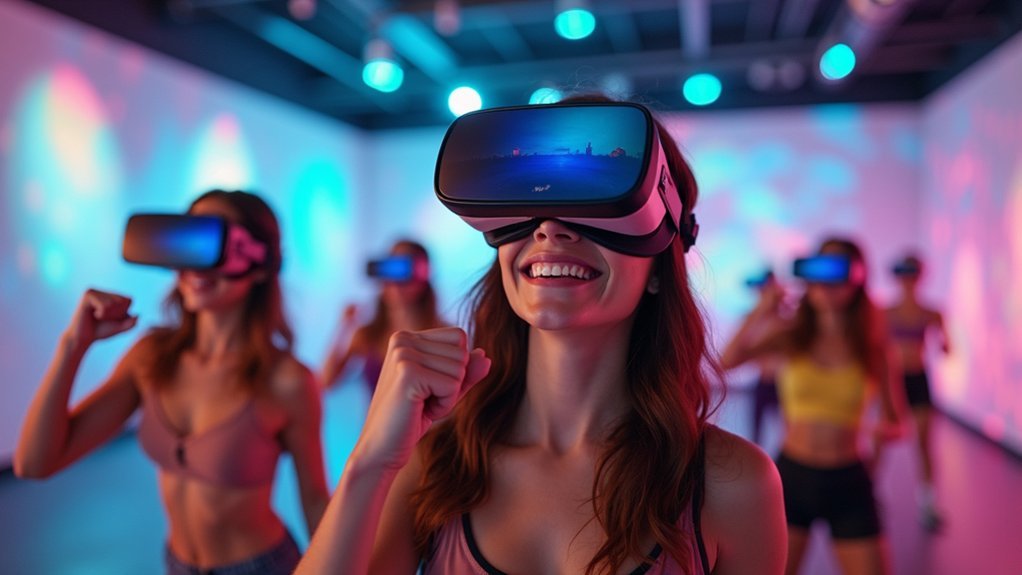
Virtual reality workouts strengthen your brain-body connection by challenging neuroplasticity through novel multisensory experiences.
You’ll engage in gamified cognitive exercises that target memory, attention, and executive functions while you move through interactive virtual environments.
These mentally stimulating activities can improve your cognitive performance and flexibility, making VR fitness particularly valuable for managing MS symptoms. Recent meta-analysis shows that VR therapy provides small improvements in immediate and delayed information recall for MS patients.
Brain-Body Connection Benefits
While traditional exercise routines focus primarily on physical movement, virtual reality workouts for MS patients create powerful cognitive-physical synergies that traditional approaches can’t match.
These immersive experiences strengthen the vital brain-body connection by integrating multisensory stimuli with coordinated movement challenges.
- Your brain forms new neural pathways as you navigate virtual environments while simultaneously controlling physical movements.
- You’ll experience improved cognitive-motor coordination as your brain processes visual cues and translates them into precise physical responses.
- Your multisensory processing sharpens when virtual auditory, visual, and haptic feedback reinforce each movement.
- You’re building cognitive resilience through varied tasks that prevent mental fatigue and habituation.
- Your neural networks activate holistically when solving problems that require both mental reasoning and physical action.
Gamified Cognitive Exercise
Transforming traditional exercise into an engaging adventure, gamified virtual reality workouts offer MS patients powerful cognitive benefits alongside physical rehabilitation.
You’ll experience improved cognitive flexibility and memory function as your brain processes the multisensory VR environment. These interactive experiences stimulate your hippocampus, potentially increasing its volume while reducing depression symptoms that often accompany MS.
You’ll find yourself more motivated to participate consistently thanks to real-time feedback and customizable challenges tailored to your specific needs. The technology combines physical therapy with cognitive training, creating a thorough approach that enhances balance, motor function, and overall quality of life. Current research exploring VR-based aerobic exercise shows it can further enhance memory and learning by providing sensory input during physical activity.
With VR’s accessibility and convenience, you can maintain a consistent rehabilitation routine that simultaneously strengthens both mind and body—even when mobility challenges arise.
Low-Impact VR Options for MS-Related Mobility Challenges
For patients with multiple sclerosis who face daily mobility challenges, specialized VR options offer promising low-impact alternatives to traditional physical therapy. These virtual environments simulate supportive conditions tailored to your needs while reducing strain and preventing fatigue.
- Walk on virtual stable paths with customized visual cues that guide your movements.
- Practice balance exercises while engaging your cognitive skills in immersive environments.
- Experience adaptive difficulty levels that match your current mobility capabilities.
- Perform rehabilitation exercises with reduced physical exertion compared to conventional therapy.
- Train in safe settings where falls are impossible but motor control improvements are real.
VR systems like CAREN-VR allow you to safely navigate varied surfaces while completing cognitive tasks, markedly improving balance and reducing fall risk with adherence rates exceeding 94%. These virtual reality interventions demonstrate lower dropout rates compared to conventional rehabilitation methods, making them more sustainable for long-term therapy.
Building Confidence Through Adaptive Virtual Environments
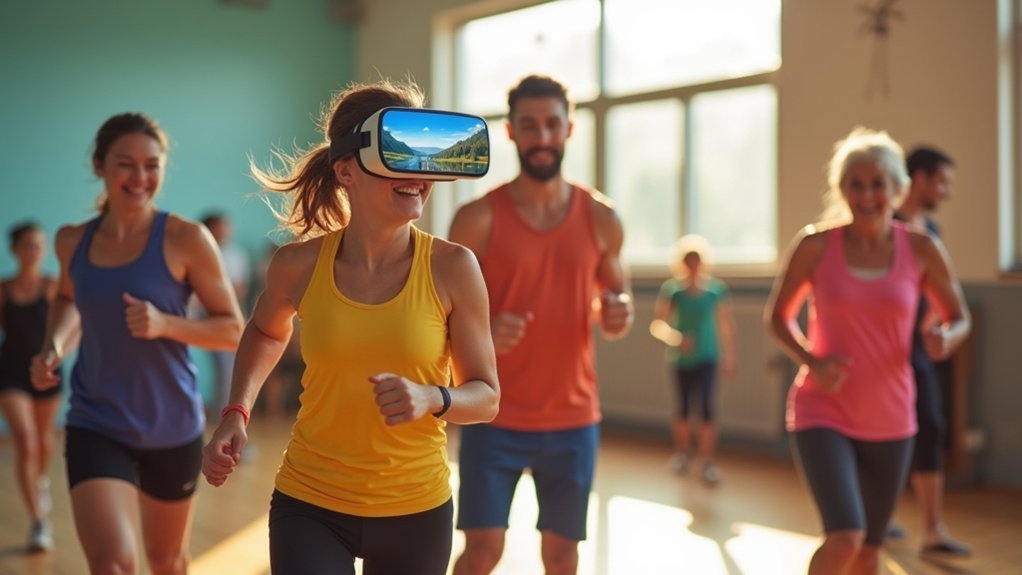
Beyond simply enabling physical exercise, adaptive virtual environments serve as powerful confidence-building tools for MS patients who often struggle with self-efficacy.
You’ll experience personalized challenges that adjust to your abilities in real-time, allowing you to progress at your own pace without fear of injury.
The immersive nature of VR creates a psychological safe zone where you can practice movements while receiving immediate visual and auditory feedback.
This multisensory approach enhances your cognitive-motor coordination and reinforces accomplishments.
Many patients report reduced anxiety and fear of falling after VR training sessions.
The gamified elements make therapy enjoyable rather than tedious, while virtual social interactions combat isolation.
As your performance improves within these adaptive environments, you’ll gain confidence that transfers to real-world physical activities.
Monitoring Progress With VR Fitness Tracking Tools
As you progress in your virtual reality fitness regimen, tracking tools provide invaluable insights into your journey with multiple sclerosis.
These sophisticated systems measure not only quantitative metrics like balance and movement speed, but also qualitative assessments of how you’re adapting to new challenges.
VR monitoring tools create powerful feedback loops that help you:
- Visualize improvements in your postural stability through colorful 3D representations
- Watch your virtual avatar master movements that once seemed impossible
- See numeric scores climb as your cognitive processing speed increases
- Track decreasing response times as your brain forms new neural pathways
- Review heatmaps showing expanded range of motion over weeks of practice
With AI integration on the horizon, these systems will soon adapt to your unique needs even more precisely.
Combining Traditional and Virtual Exercise Methods
While tracking tools capture your progress in the digital domain, an all-encompassing MS fitness approach combines both virtual and traditional exercise methods for maximum benefit.
This flexible strategy increases adherence to your exercise routine while addressing multiple aspects of MS management. Online exercise programs have been specifically developed to address accessibility issues for those facing environmental barriers like inadequate transportation or inaccessible facilities.
You’ll gain improved physical function through exercises that enhance balance, walking ability, and muscle strength—whether at home or in a gym.
The psychological benefits are equally powerful, with regular activity improving cognitive function, sleep quality, and reducing depressive symptoms.
Frequently Asked Questions
Can Exercise Worsen MS Symptoms During Flare-Ups?
Yes, during MS flare-ups, exercise can worsen your symptoms due to increased sensitivity to heat and physical stress. You’ll want to rest instead, allowing your body to recover effectively before gradually resuming activity.
How Soon After Diagnosis Can MS Patients Begin Fitness Programs?
You can start fitness programs right at diagnosis. It’s ideal to begin early and continue without interruption, but always consult your healthcare provider first to create a personalized approach for your needs.
Are There Specific Exercises to Avoid With MS?
You should avoid exercises that cause overexertion, excessive heat exposure, or unsafe conditions. Skip activities that lead to fatigue, unstable movements, or occur in hot environments. Focus on functional exercises tailored to your abilities.
How Does Heat Sensitivity Affect Exercise Options for MS Patients?
Heat sensitivity may limit your exercise options as it can worsen MS symptoms. You’ll want to choose cooler environments, use cooling vests, exercise in water, and avoid peak heat times during the day.
What Role Does Nutrition Play Alongside Exercise for MS Management?
Nutrition works synergistically with your exercise routine to manage MS. You’ll experience reduced inflammation, better energy levels, and improved disease outcomes when you combine a healthy diet with regular physical activity.
In Summary
You’ve seen how VR fitness offers multiple sclerosis patients unique benefits beyond traditional exercise. It’s not just about physical improvements in cardio health, fatigue levels, and mobility—you’re also gaining mental health support and social connections. By combining virtual and conventional training methods, you’ll find adaptive options that work for your specific needs. Track your progress, build confidence, and embrace this innovative approach to managing MS through movement.

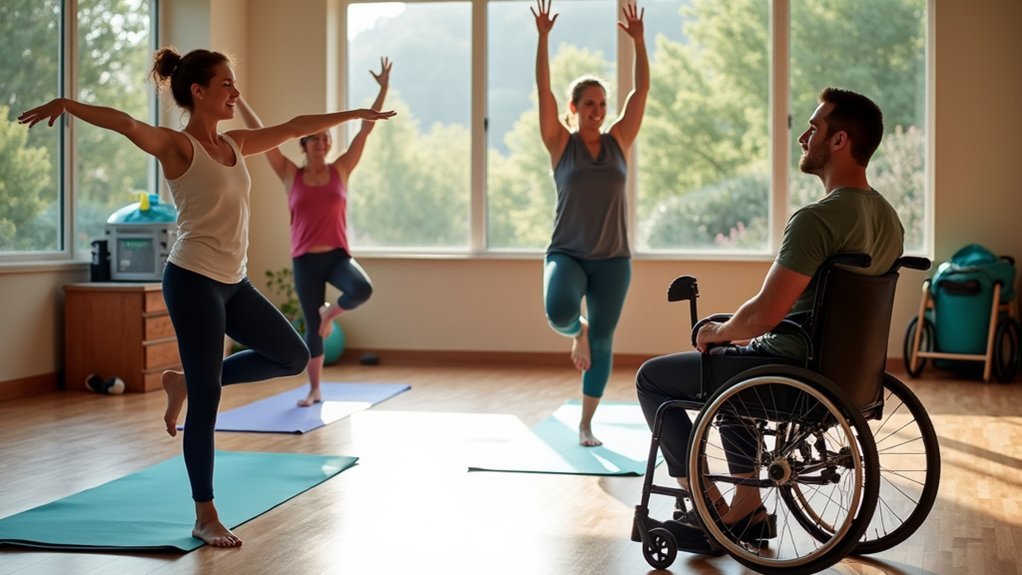
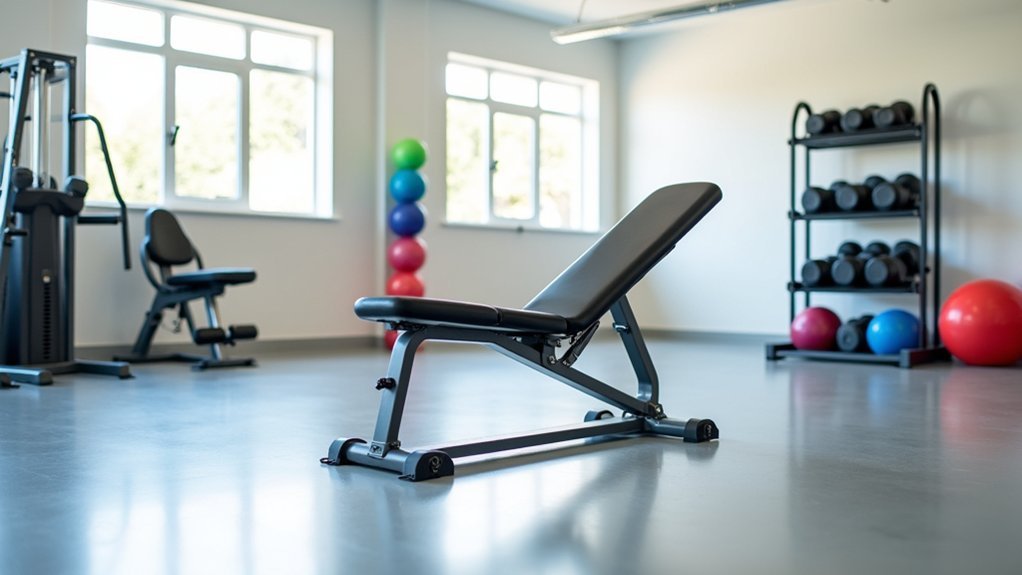
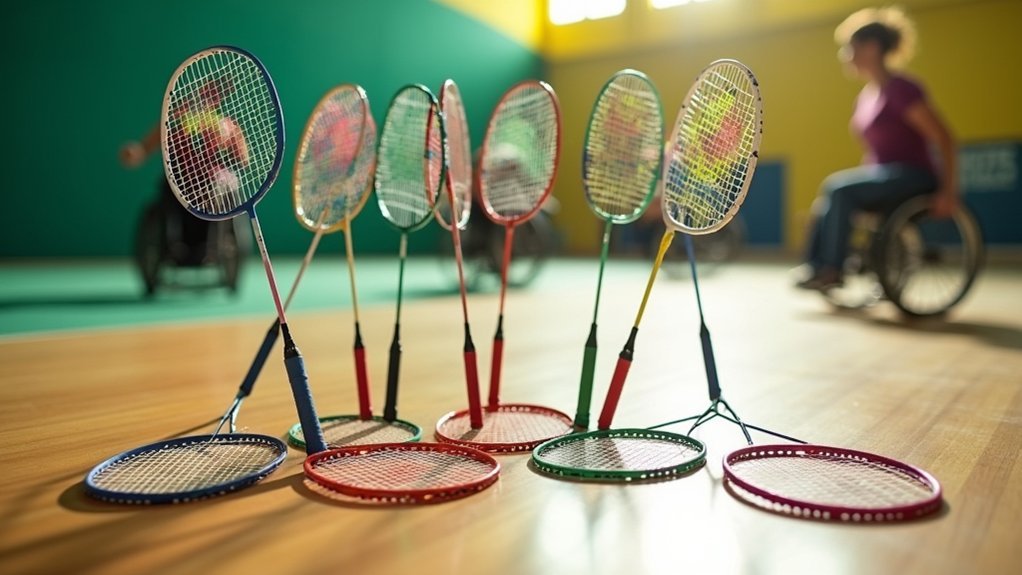

Leave a Reply